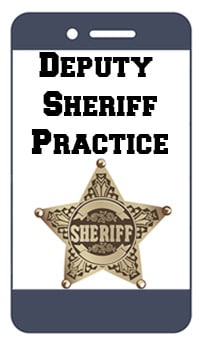Deputy Sheriff Practice Written Exam

What’s on this page
Difference between Police and Sheriffs — Key Skills and Challenges — Application Process & Eligibility — Practice Questions — Online Course
What Is the Difference Between a Deputy Sheriff and a Police Officer?
Deputy sheriff and police officers have different jurisdictions. A deputy sheriff is responsible for an entire county, which often includes a number of small towns and even several larger cities.
A police officer is responsible for preventing crime within the city limits. This includes patrolling the city, issue tickets, and testifying in court.
Deputy sheriff’s job varies by state. This could include working in a county jails, investigating crimes or accidents, security in courts and issuing warrants.
Key Skills and Qualities to Become an Effective Deputy Sheriff:
Strong Communication Skills: Effective communication skills are essential to effectively interact with the public, other law enforcement agencies, and colleagues. The ability to communicate clearly and effectively is necessary for all law enforcement positions.
Physical Fitness: Deputy Sheriffs need to be in excellent physical condition. Duties often involve running, jumping, and physically restraining suspects.
Emotional Intelligence and Control: Deputies need to have a high level of emotional intelligence to manage their emotions to function in a high-pressure and sometimes dangerous environment. This includes the ability to remain calm, focused, and composed in stressful situations, and to exhibit empathy and understanding towards others.
Problem-Solving Skills: Deputy Sheriffs are often required to think on their feet and come up with quick solutions to problems that arise in the field. Deputies must be able to analyze situations, identify problems, and determine the most appropriate course of action.
Critical Thinking: Deputies are often required to make fast, informed decisions in complex or ambiguous situations. This includes, evaluating information, identifying risks. This is an essential skill for all law enforcement.
Ethics and Integrity: As representatives of the law, Deputy Sheriffs must be committed to maintaining high ethical standards and integrity. This includes honesty, respect, and fairness, upholding the law without bias or discrimination.
Effective Teamwork: Sheriffs work as part of a team and must collaborate with colleagues for common goals. This includes, communicating, sharing information, and supporting each other.
Challenges Sheriffs Face
Danger and Risk: Deputy Sheriffs often work in high-risk situations that can involve physical harm or injury. They may have to deal with violent suspects, dangerous weapons, and other hazardous situations on a daily basis.
Stress and Trauma: The nature of law enforcement work can be emotionally and psychologically taxing. Deputy Sheriffs are often exposed to traumatic events, such as accidents, crime scenes, and violent incidents, which can take a toll on their mental health and wellbeing.
Public Perception: Law enforcement officers, including Deputy Sheriffs, may be subject to negative public perception and scrutiny, especially in the wake of high-profile incidents or cases of misconduct. This can lead to increased stress, anxiety, and distrust among the communities they serve.
Limited Resources: Many law enforcement agencies, including sheriff’s departments, face budget constraints and limited resources, which can impact the ability of Deputy Sheriffs to effectively perform their duties.
Work-Life Balance: The nature of law enforcement work, with long hours, shift work, and irregular schedules, can also impact the work-life balance of Deputy Sheriffs, and may lead to increased stress and fatigue.
Application Process
1. Check Eligibility Requirements
Most of the counties require the following for a candidate to qualify to become a Deputy sheriff:
- Be a United States citizen
- At the time of hire, the candidate must be 21 years old or above
- Have a high school diploma
- Excellent mental and physical health. For men, 20% maximum body fat while 26% for women
- Have a 20/100 or better vision in each eye, or correctable to 20/20
- Have a valid driver’s license with an excellent driving record
- Have good moral behavior and character
- Have a clean criminal record
- Never engaged in an activity supporting felony or domestic violence
- Military training or experience is an added advantage
- A college degree, though not a requirement, makes one more desirable to agencies.
2. Submit an Application: Application can be online or in person.
3. Written Exam: Take a written examination, which tests their knowledge of basic math, reading comprehension, and writing skills. See Below for more details. Practice questions here
Physical Fitness Test: Candidates must pass a physical fitness test, to demonstrate physical abilities such as running, jumping, and carrying heavy objects.
Background Check: Pass a criminal history check, credit check, and a check of personal references.
Polygraph: Candidates may be required to take a polygraph examination depending on the county.
Interview: Candidates who pass all of the previous stages are interviewed by department officials or superior officers, to assesses interpersonal and communication skills, as well as knowledge of law enforcement and general character.
Medical and Psychological Evaluation: Candidates must undergo a medical and psychological evaluation to ensure they are physically and mentally fit.
Eligibility
Most of the counties require the following for a candidate to qualify to become a Deputy sheriff:
- Be a United States citizen
- At the time of hire, the candidate must be 21 years old or above
- Have a high school diploma
- Excellent mental and physical health. For men, 20% maximum body fat while 26% for women
- Have a 20/100 or better vision in each eye, or correctable to 20/20
- Have a valid driver’s license with an excellent driving record
- Have good moral behavior and character
- Have a clean criminal record
- Never engaged in an activity supporting felony or domestic violence
- Military training or experience is an added advantage
A college degree, though not a requirement, makes one more desirable to agencies.
Hiring Process
Want to become a deputy Sheriff? The following are the steps followed by agencies in the hiring process:
- Testing in math, writing, and reading
- Thorough background check
- Clean driving record
- Physical exam and a stress test
- Psychological assessment
- Interview with a designee or Sheriff
Deputy Sheriff Practice Questions I Recommend
As someone who has prepared for many many tests, I can’t stress enough how valuable practice questions are. When I started studying, I felt overwhelmed by the breadth of content covered in the test. But working through practice questions was a game-changer for me.
Here’s why I recommend these practice questions:
Get used to the Format: The Deputy Sheriff test has a specific format, and the more you know about it, the better your score!
Identify your Weak Areas: This is the key to test prep for the deputy sheriff or any test. When I first started practicing, I quickly realized which areas I needed to focus on more. Whether it was reading comprehension, or language skills, working through practice questions helped me pinpoint my weaknesses so that I could spend more time improving in those areas.
Building up your Confidence: The more questions I answered, the more confident I became. Practice questions gave me the confidence that I could handle whatever the test threw at me.
Time Management on a Test: One of the biggest challenges I found was managing my time. Practice questions under timed conditions, boosted my confidence. How to manage your time on a test
Reviewing Mistakes: Every time I got a question wrong, I looked at the explanation and trued to understand my mistake.
Reading Comprehension
Types of reading questions that generally appear on the exam.
- Drawing logical conclusions
- Make predictions
- Analyze and evaluate the use of text structure to solve problems or identify sequences
- Vocabulary – Give the definition of a word from context
- Summarize
Reading Comprehension Practice
Composition
This section tests your ability to articulate in writing, complex thoughts in a clear and concise way that is understandable to others.
This includes, vocabulary, spelling and English grammar.
Logic and Problem Solving
Questions likely to appear on the test:
- Ordering information in a logical sequence
- Map reading
- Solving problems
- Identifying patterns in data
How to Answer Different Types of Questions
Deputy Sheriff Online Practice Course
Get ready for your Deputy Sheriff Written Test!
- Over 250 Practice Questions
- Quizzes, Tutorials and Self-Assessments
- Timed Test – Just like the real thing!
Date Published: Monday, January 4th, 2021
Date Modified: Wednesday, August 28th, 2024

